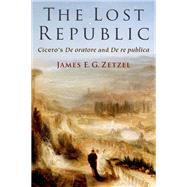The Lost Republic Cicero's De oratore and De re publica
, by Zetzel, James E. G.- ISBN: 9780197626092 | 0197626092
- Cover: Hardcover
- Copyright: 4/22/2022
Cicero's dialogues De oratore (On the Orator) and De re publica (On the Commonwealth), composed between 55 and 51 BCE, examine two topics central to Roman public life: the role of the orator in society and the importance of honorable statesmanship for the preservation of republican government--which came to an end in Rome with the dictatorship of Julius Caesar only a few years later. The two dialogues are closely related to one another in Cicero's choice of Plato as a literary model, in the selection of Roman public figures of the two generations before Cicero as speakers, and in their intertwined arguments about the values of civic life and political engagement.
The Lost Republic provides the first detailed analysis of these two dialogues taken together. It demonstrates how carefully they complement one another and, in addition to explaining their arguments and their place in the history of rhetoric and political theory respectively, reads them as the first examples of literary dialogue in Latin. Cicero, as James Zetzel demonstrates, uses Platonic models as a means to question the value of Platonic ideals, just as he uses an idealized portrait of Roman aristocrats of earlier generations both to praise and to interrogate the virtues of the Roman past. The two dialogues create a complex and subtle argument about the relationship between the traditional values of Rome and the new approaches to both ethics and rhetoric brought by Greek philosophy. By treating these dialogues as masterpieces of literary imagination shaped to present a compelling vision of the intellectual and moral underpinnings of civil society, Zetzel makes an original and important contribution to our understanding of Cicero and of the world in and about which he wrote.
The Lost Republic provides the first detailed analysis of these two dialogues taken together. It demonstrates how carefully they complement one another and, in addition to explaining their arguments and their place in the history of rhetoric and political theory respectively, reads them as the first examples of literary dialogue in Latin. Cicero, as James Zetzel demonstrates, uses Platonic models as a means to question the value of Platonic ideals, just as he uses an idealized portrait of Roman aristocrats of earlier generations both to praise and to interrogate the virtues of the Roman past. The two dialogues create a complex and subtle argument about the relationship between the traditional values of Rome and the new approaches to both ethics and rhetoric brought by Greek philosophy. By treating these dialogues as masterpieces of literary imagination shaped to present a compelling vision of the intellectual and moral underpinnings of civil society, Zetzel makes an original and important contribution to our understanding of Cicero and of the world in and about which he wrote.







